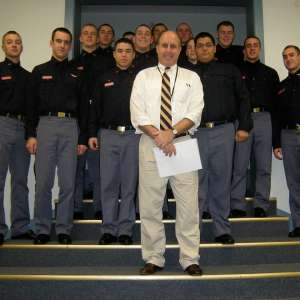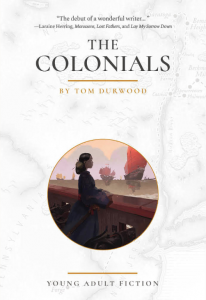 Tom Durwood is a teacher, writer and editor with an interest in history. Tom most recently taught English Composition and Empire and Literature at Valley Forge Military College, where he won the Teacher of the Year Award five times. Tom has taught Public Speaking and Basic Communications as guest lecturer for the Naval Special Warfare Development Group at the Dam’s Neck Annex of the Naval War College.
Tom Durwood is a teacher, writer and editor with an interest in history. Tom most recently taught English Composition and Empire and Literature at Valley Forge Military College, where he won the Teacher of the Year Award five times. Tom has taught Public Speaking and Basic Communications as guest lecturer for the Naval Special Warfare Development Group at the Dam’s Neck Annex of the Naval War College.
Tom is editor of an online scholarly journal, The Journal of Empire Studies (www.empirestudies.org).
Tell us about your book.
The Colonials is an adventure story about six rich kids from around the world who long to get involved with the American War of Independence. One by one, the teens get caught up in the Colonial cause, and find that battling for freedom is not what they thought. The narrative follows each in turn, ending with an Ottoman prince (Mahmet) clashing arms with the British on the battlefield at Saratoga.
One theme of the book is the idea that the American Revolution was part of a global revolution. France, Russia, Germany, Canada, The Netherlands, even India played a part in the overall narrative of the American War of Independence.
Why did you want to write a book?
I am compelled to write. I’m sure it has to do with identity. I try figure out who I am through my writing.
As to why this book, why this set of books, I felt I needed a big frame to hang my writing on. I wrote four novels during my industrious twenties, and they were just terrible. Those failures pointed me to working over very long stretches of time to focus on a single project, to build a story like an architect builds a house.
Since it has been a very long (over the span of two decades) and rocky road from start to finish of each adventure, it’s hard to say where they start. Usually there is a big idea about geology or botany that strikes me as interesting, then years and years of trial-and-error as I try to fashion an honest story in front of that idea.
For Ulysses S. Grant in China, I came across a photo of Grant sitting beside the great Chinese leader, Li Hong Zhang. That was surprising – I had no clue that Grant ever visited Asia. It turns out that this was a tumultuous time in China. So it seemed natural to come up with an adventure surrounding that visit. I place Grant in the middle of a band of teen protagonists (of course), and the swirling forces that were about to explode in the Boxer Rebellion.
The fourth book I’m working on started in the 90’s with two catalysts: an article about the end of the Maya Empire; and a memoir by an American diplomat named Haldore Hanson on Norman Borlaug and the new wheats that started the Green Revolution.
As a writer, what is your schedule? How do you get the job done?
When I’m teaching, I don’t write so much as I jot down notes, do research, block out scenes and chapters, and collect ideas. Life moves at too fast a pace, and I am someone with too many things bouncing around my brain. I tend to produce writing that is disconnected. I need tons of calm to write something half-decent.
During the summer, I try to do as little as possible except write, exercise, and read. I drop all the notes, put way all the research, and try to write a fresh story.

The Colonials is part of a trilogy of books – ten adventure stories, all published at the same time, in hardback and as ebooks – which take adventure plots and set them against turning points in history. My aim is to tell an honest and eventful story and, in doing so, to evoke deeper historical themes.
In King James’ Seventh Company, an adventure revolving around the creation of the King James Bible, one of the big ideas beneath the story’s surface is language is an instrument of empire. In this unusual case, three empires come together – the Christian empire, with all its dark history and competing texts; the British Empire; and the “empire” of the English language, which still dominates the globe today.
Ulysses S. Grant in China and Other Stories, the third book in the collection, features a war of succession in the Benin Kingdoms of Africa, a murder in 17th century Amsterdam, an Egyptian girl trying to save the Suez Canal, and an American president in the Boxer Rebellion.
I find tremendous story values in these historical settings and characters. The events are rich in irony. I hope to produce an entire set of such adventures. My stories are all connected by a particular set of characters.
Who are your biggest writing inspirations and why?
I read and re-read Louis L’Amour’s westerns and Robert E. Howard’s pulp fiction, for their sheer forward motion. I believe their fictional worlds. In the past, I have gone through series of detective novels and police procedurals. I have read most of John Buchan. I am currently making my way through back years of the Best American Science and Nature Writing series by Houghton Mifflin as well as the Write Bloody poetry books.
When I was young, I loved Esther Forbes’ Johnny Tremain, and it seems like a model for my own work. When I’m stuck, I read Rachel Carson.
Why did you write about this particular subject?
In The Colonials, I wanted to show that the War for Independence was won on trading floors of Amsterdam and diplomatic offices of St. Petersburg, as well as battlefields in Concord and Lexington. So I needed a character to personify each of the far-flung nations, as well as a way to bring them together.
The School for Young Monarchs was a device that seemed to work for the rising section of the story, allowing me to establish characters with legitimate hopes, needs, and contradictions. It took three years to figure out a clever, legitimate way for each to make a contribution to the cause. The second half of the novel became the resolution of each character’s storyline – several of which (of course) turn tragic. The image of an Ottoman boy in a colonial uniform kept me going. I stashed flashback chapters two-thirds of the way through the book so I would not slow the action.
The logo on the spine of your books says, “Empire Studies.” What is that?
I taught at Valley Forge Military College for eight years, and one of my courses looked at Empire and Literature. The idea was to connect literature with the rise and fall of empire – the cadets seemed to enjoy it, and I started an online, open-access journal to collect and introduce some of the academic writing about empire.
My adventure stories are an extension of my interest in empire. They take place at turning points in empire.
Where did you find the illustrators whose work we see on the covers and interiors?
Some extremely talented illustrators who work for the gaming and movie industries also post their work online. Anta (King James’ Seventh Company) is from Ukraine, Victorin (Ripert, The Colonials illustrator) lives in France, and Edmund Liang (USG in China) lives in California. Jason Juta, who did the endpaper maps, is in England.
How did your book change over time? What revisions did you make from the from first draft to final?
The exposition and background layer came first and easiest, since this is cheap writing. It bears almost no value to readers, who care only for characters.
The action and adventure layer came next. For a decade, I was trying to write in a comprehensive, all-inclusive style like two of my heroes, Tom Clancy and James Michener. Once I dropped that ambition, my own style slowly emerged.
It turned out that, with each of these books, I would disappear from writing for three or four years to deal with real life. On return, I would see what was the manuscript was missing. I could see what the characters needed. Most of the important elements came in this third revamp.
What are your plans now your book is published?
Lots more writing! There are several more historical turning points that really suit my teen-protagonists-versus-corrupt-powers approach.
I am halfway through “The Detective,” the fourth book in the Navigator series. I should have a sample chapter of that to post for readers in Summer 2018. This is a noir story built around a young cop on a corrupt city police force. The cop’s story takes him into what I hope is a surprising and treacherous landscape, and a crime with a vast backstory.
“The Detective” should be closely followed by a collection of stories set at the turn of the 20th century, also with a fairly dark twist.
I have also commissioned four very talented artists to do a graphic-novels adaptation of several of my stories. Their work should help open up my writing – which is fairly dense and action-packed — especially for younger readers. That illustrated adaptation should be ready in March or April. I hope to do more of them, as sales permit.
I may take a semester off from teaching to work on my online journal, The Journal of Empire Studies, as well as on my adventure writing.
Links
Author Site
Twitter
Amazon
Goodreads
Get an Editorial Review | Get Amazon Sales & Reviews | Get Edited | Get Beta Readers | Enter the SPR Book Awards | Other Marketing Services






















Leave A Comment